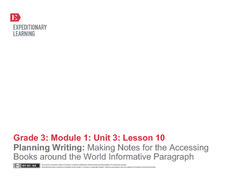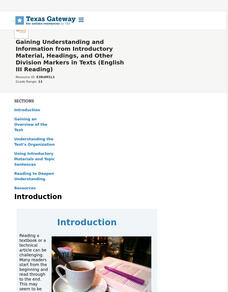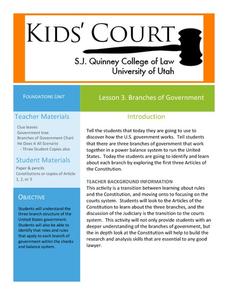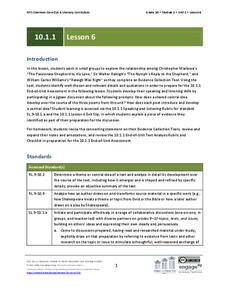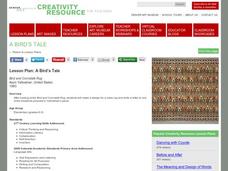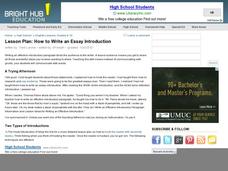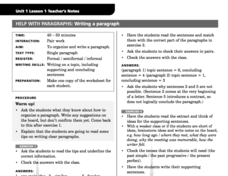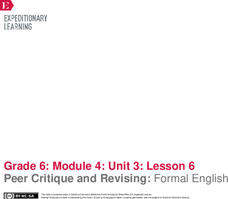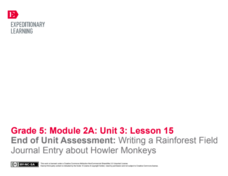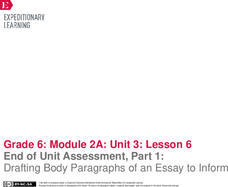EngageNY
Performance Task Preparation: Peer Critique and Mini-Lesson Addressing Common Errors: Revising Draft Essay to Inform
Time to revise! Using a writing evaluation rubric, scholars participate in a peer editing process to provide feedback on each others' informative essays. Next, pupils begin revising their drafts based on the feedback they receive.
EngageNY
Planning Writing: Making Notes for the Accessing Books Around the World Informative Paragraph
Encourage your young writers to thoughtfully plan and organize their work. First, model how this is done and vocalize your thought process as you work. Next, create a class list of strategies that they can use during independent writing...
EngageNY
Informative Paragraph Pre-Assessment: What Is One Reason You Want the Power of Reading?
This writing pre-assessment has minimal instruction but maximum support and encouragement. It begins with a review of the book, Rain School, through a think-pair-share and small group discussion. The discussion focuses on the idea that...
EngageNY
Editing and Publishing: Accessing Books Around the World Informative Paragraph
Provide time to polish paragraphs in class. Pupils, who have been working on these informational pieces for several days now, will have a chance to check for spelling and grammar before publishing their work. Sure to be a rewarding final...
NPR
Chinese American Women Lesson Plan
The National Women's History Museum provides a plan designed to accompany their online CyberExhibit, Chinese American Women; a History of Resilience and Resistance. After examining a series of primary and secondary source documents,...
K20 LEARN
Bear Tale: Author's Purpose - Informing Or Entertaining
After reading The Mitten by Jan Brett, scholars discuss the author's purpose. Small groups compare and contrast a book written to entertain and a book to inform, then create a T-Chart detailing the characteristics of each. Learners...
Curated OER
Lesson Plan for Japan
The effect of cultural beliefs on the progress and industrialization of a society is an interesting idea to consider, and this is certainly true in this lesson plan on feudal Japan. Your young historians will read informational texts on...
California Department of Education
Hitting the Write Note: Writing a Proposal
To whom it may concern ... Scholars undergo the process of writing a letter to an authority figure. The activity asks writers to compose a formal letter requesting a music therapy space. Pupils learn how to submit a project proposal to...
Texas Education Agency (TEA)
Gaining Understanding and Information from Introductory Material, Headings, and Other Division Markers in Texts (English III Reading)
All teachers are teachers of reading! The 13-part interactive series ends with a lesson that teaches learners (and their instructors) how to approach reading their textbooks. After learning about several strategies, users test their...
Curated OER
Lesson 3: Branches of Government
Young historians climb through the three branches of the US government in the third lesson of this five-part series. While reading the first three Articles of the Constitution in small groups, children write facts on paper leaves that...
Scholastic
Lesson One: The Earth, Background and Glossary
How much do you really know about our planet? Middle schoolers build up their prior knowledge about Earth, its placement in the solar system, its composition, and important geological vocabulary with an introductory earth science lesson.
EngageNY
Grade 10 ELA Module 1: Unit 1, Lesson 6
Wrap up your literary analysis unit with a discussion activity as tenth graders prepare for an end-of-unit assessment. After they have read and annotated Christopher Marlowe's "The Passionate Shepard to His Love," Sir Walter Raleigh's...
Curated OER
Letter Writing and Abigail Adams
Third graders learn the importance of letter writing for communication. In this letter writing lesson, 3rd graders identify how letter writing was important in the life of Abigail Adams. Students understand what a primary source is and...
Curated OER
Lesson Plan: A Bird's Tale
Who wouldn't love to get a letter from a blue bird? Elementary art enthusiasts analyze the social and historical context of Ason Yellowhair's Navajo piece, Bird and Cornstalk Rug. They examine the construction and images on the rug...
Curated OER
Check My Writing
Use this resource as an evaluation tool, or have your class assess their own letter writing skills. They will use a checklist that they create during some interactive writing sessions as criteria for their self-evaluation. Teachers can...
Curated OER
Writing an Informal Letter
What is the difference between formal and informal letter writing? Who gets a formal letter? What about an informal letter? This reference page presents different introductions and phrases you might see in each type of letter, and then...
Curated OER
Publishing a Newspaper about Biomes
Young journalists create newspapers of individual biomes after researching their biomes. This instructional activity can be completed in three phases and concludes with each person publishing their individual newspaper pages.
Bright Hub Education
How to Write an Essay Introduction
Clichéd and repetitive introductions got you down? Try this lesson on for size! Start off by instructing your class members on techniques for writing introductions and what types of introductions they should avoid. Several general lesson...
Curated OER
Help With Paragraphs: Writing A Paragraph
Young scholars complete exercises to practice writing a paragraph. In this paragraph writing lesson plan, students work in pairs to complete activities that require them to read sample paragraphs, organize sentences in sequence, and...
Curated OER
Author's Purpose Lesson Plans
Why do we practice identifying the author's purpose? Read this article to gain a better understanding of this reading strategy, and then peruse the attached lesson plans!
EngageNY
Peer Critique and Revising: Formal English
Dear Sir or Madam: What's the difference between formal and informal language? Scholars focus on using formal English and transitions in their position papers. After revising their rough drafts, they engage in the peer editing process...
EngageNY
End of Unit Assessment: Writing a Rainforest Field Journal Entry about Howler Monkeys
Give me more details. Scholars complete an end of unit assessment by creating an information text box to go with their field journal entries about howler monkeys. Learners use the class time to work independently.
EngageNY
End of Unit Assessment, Part 1: Drafting Body Paragraphs of an Essay to Inform
Anybody can write a body paragraph! Pupils analyze the development of ideas in a body paragraph from a model essay. Next, using what they've learned, they draft the body paragraphs of their My Rule to Live By informative essay.
California Education Partners
Eleven
It is difficult to articulate how growing up feels as accurately and beautifully as Sandra Cisneros does in her short story "Eleven." After seventh graders read the story and note the author's use of figurative language, they respond to...



